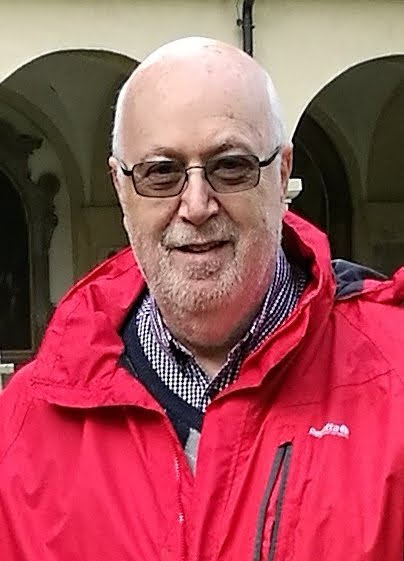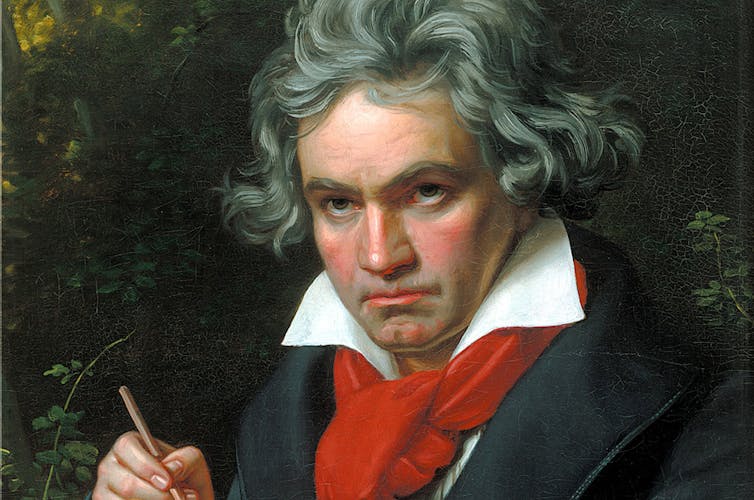Michael Lawson: A Breathless Epic of the Great Romantic Pianists
International Acclaim: One Piano, Eight Hands (Amazon) is a factional novel by Michael Lawson told by an omniscient narrator who slips seamlessly in and out of anonymity as the action unfolds. Four generations of the talented but fictional Steinfeld family parade through the plot, performing in the piano’s golden age, the height of the Romantics. Many of the greats appear -- Rachmaninov, Godowsky, Taneyev, Siloti, Hoffmann, Medtner, Moiseiwitsch, Friedman, Gabrilowitsch, Blumenfeld, Schnabel and one of Lawson’s own teachers, the “tender tyrant” Nadia Boulanger.

Readers must be on their toes as 68 characters rotate to keep the narration spinning. Lawson’s knowledge of 19th century Europe through his Polish ancestors enrich the story, notably with several scenes of terrible tragedy -- fictional injuries in fires, psychological conflict, the near extinction of the family name in a Polish pogrom, and finally the death in public of the latest family star, Daniyal.
This novel is nothing short of a Tolstoian epic.
Author Lawson, a true polymath, is up to the task. He is an accomplished pianist and composer, retired archdeacon of the Church of England and author of some 14 books.
Here is a clip of “Impressions for Solo Piano”, one of his recent compositions:
https://soundcloud.com/michael-lawson-351452220/impressions-for-solo-piano
Rounding out his career, Lawson is also a trained psychotherapist who has worked with several pianists, including child prodigies. He brings all these strands together in a breathless story.
“I am and always have been fascinated by the great Romantic pianists,” he tells me in email exchanges over several days. It shows.
Originally inspired by accounts of virtuoso Simon Barere’s death in 1951 at a Carnegie Hall recital, Lawson says he “knew how the novel would end but not how it would begin”. The story occupied his attentions for some 40 years, the last six months of which were dedicated to non-stop research and writing six days a week. For easy reading, he has structured his story in five ”movements”, each consisting of several brief chapters, some only two pages long.
He takes interesting detours to fill in backdrop of the environment -- the German bombing of London, the pogrom in Lvov (now Lviv) in 1918, Jewish family life, piano competitions and the history of the piano. The subtitle takes its name from the fictional four generations of virtuosi – imagining his main players, Abramczyk, Aleksander, Daniyal, Kovi making music together, on one piano, eight hands.
Lawson brings in a subtheme of exceptional interest, the phenomenon of the child prodigy, an accident that he estimates occur once in five or ten million births. He invokes his therapeutic expertise to warn of over-praise of prodigies from family and the public. “Can a child ever receive too much love? … We are now discovering that sustained exaggerations of esteem from parents or any circles of admiring approval can be harmful.” (It) can inhibit the growth of a healthy and robust, self-critical super-ego.”
The great teacher Leschetizky carries on, cautioning that an “excess of applause at an early age may help cerate unhealthy performance appetites in later life”. Audiences sometimes help create such the prodigy, and, adds Lawson: “ … some will flock to see a child perform as they might jostle for the best seat at the circus.” Aleksander’s parents stepped in to slow the process. They decided that he would not undertake public concerts until his seventh birthday.
Lawson’s career at the piano also translates into some of the more dramatic passages in the repertoire. Discussing Chopin’s Etude No. 11 op 25 (“Winter Wind”), he writes of the pianist’s intense concentration in the slow theme at the outset. “Then, like an exploding volcano, a tumultuous cascade of sixteenth notes erupted from the top of the keyboard; the left hand leaping in punctuation fury, driving forward the rhythm of the raging wind and sudden lighting flashes, and the final theme, bringing Chopin’s death-defying Etude … to its breathless conclusion.”
The Etude is performed here by Yulianna Avdeeva:
Lawson takes a swipe at pianists whose acrobatics onstage “let us know they have danced with death and prevailed”. “Their shoulders rise and fall with their heavy breathing, their hands run maniacally through their touseled hair (and) they practically swoon there on stage in front of us.” He adds that Franz Liszt was the inventor of this “bizarre behavior”. Many of today’s prominent players have gone further. Lang Lang, for example, wears makeup and winks at the audience between swoons while bouncing on the piano bench.
Family life is enlivened with the joy of Jewish humor and culture. At one point, Aleksander receives in the post an invitation to perform with the New York Philharmonic. The family and guests burst into a singing, dancing version of the popular Russian folk song “Kalinka My Kalinka” gradually ratcheting up the tempo to breakneck speed.
The dance is performed here:
The text is peppered with tips on piano performance, one of which is the need to practice relaxing. “Remember that tension is the enemy,” Lawson writes. “It squeezes glue all over the keyboard and in all kinds of ways gums up your playing.”
Critical reception to the novel has thus far been favorable, as has reader reaction. One reader wrote to Lawson that the connections and convergences in the plot are “so beautifully written, it brought me to tears.”
I know of no other writer who can draw on such a varied and pertinent background and weave them into a single tale.
Why did Lawson set himself the monumental task of researching and writing this epic? This book might seen as swan song or a cathartic exercise, but Lawson disagrees. He considers it it as “a celebration of music, musicians, and the creative spirit that animates my present and future.” I totally agree.
END
This article is brought to you by the author who owns the copyright to the text.
Should you want to support the author’s creative work you can use the PayPal “Donate” button below.
Your donation is a transaction between you and the author. The proceeds go directly to the author’s PayPal account in full less PayPal’s commission.
Facts & Arts neither receives information about you, nor of your donation, nor does Facts & Arts receive a commission.
Facts & Arts does not pay the author, nor takes paid by the author, for the posting of the author's material on Facts & Arts. Facts & Arts finances its operations by selling advertising space.




















